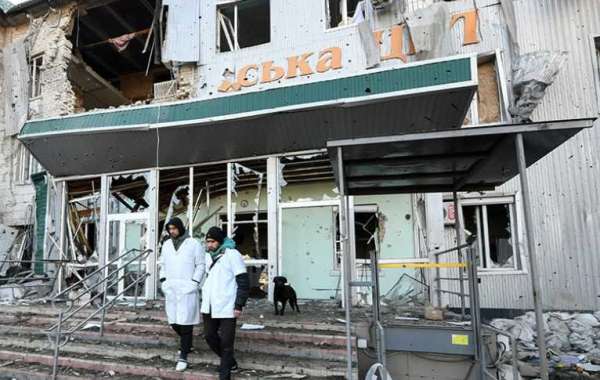
Public Health Catastrophe Looms in Ukraine
Even before the war, the country struggled with epidemics of H.I.V., tuberculosis and hepatitis. The conflict threatens to undo decades of progress. A convoy of five vans snaked slowly on Friday from the battered Ukrainian capital, Kyiv, toward Chernihiv, in the northeast of the country. On board were generators, clothes, fuel — and medications needed to treat H.I.V.
With a main bridge decimated by shelling, the drivers crept along back roads, hoping to reach Chernihiv on Saturday and begin distributing the drugs to some of the 3,000 residents in desperate need of treatment.
Organizers of efforts like this one are rushing to prevent the war in Ukraine from morphing into a public health disaster. The conflict, they say, threatens to upend decades of progress against infectious diseases throughout the region, sparking new epidemics that will be nearly impossible to control.
Ukraine has alarmingly high numbers of people living with H.I.V. and hepatitis C, and dangerously low levels of vaccination against measles, polio and Covid-19. Overcrowded and unsanitary living conditions for refugees are breeding grounds for cholera and other diarrheal diseases, not to mention respiratory plagues like Covid-19, pneumonia and tuberculosis.
“If they don’t get the medicines, there is a high risk that they will actually die because of the lack of therapy, if they don’t die under the shelling,” said Dmytro Sherembei, who heads 100% Life, the organization delivering medications to Chernihiv residents with H.I.V.
Mr. Sherembei, 45, learned he had H.I.V. 24 years ago. He is one of more than 250,000 people in Ukraine living with the virus, a huge epidemic driven largely by the sharing of contaminated needles among intravenous drug users.
Ukraine and the surrounding region also make up a world epicenter of multi-drug-resistant tuberculosis, a form of the disease impervious to the most powerful medications.
The Ukrainian health ministry in recent years had made progress in bringing these epidemics under control, including a 21 percent drop in new H.I.V. infections and a 36 percent decline in TB diagnoses since 2010.
But health officials now fear that delays in diagnosis and treatment interruptions during the war may allow these pathogens to flourish again, with consequences that ripple for years.
“Last year, we were working to differentiate between different TB mutations,” Iana Terleeva, who heads tuberculosis programs for Ukraine’s Ministry of Health, said in a statement. “Now instead, we are trying to differentiate between aerial shelling, raids and other military hardware.”
The fighting also has damaged health facilities throughout the country and spawned a refugee crisis, imperiling thousands of people with chronic conditions like diabetes and cancer who depend on continuing care.
“Everything is at very high risk, as it is always in the battlefield,” said Dr. Michel Kazatchkine, a former U.N. secretary general envoy for Eastern Europe.
“We should anticipate major health crises with regard to infectious diseases and chronic diseases across the region that I expect to be severe and durable,” he added.
The war “will have a huge impact on health systems that are already very fragile,” Dr. Kazatchkine said.
WHO says attacks on health facilities are rising daily
There have been more than 70 separate attacks on hospitals, ambulances and doctors in Ukraine with the number increasing on a "daily basis", says the World Health Organization (WHO). It says the targeting of healthcare facilities has become part of the strategy and tactics of modern warfare.
A recent casualty on 8 March was the newly refurbished central hospital in Izyum, south of Kharkiv.
It was hit by what the Ukrainian authorities said were Russian shells.
Video and photos posted online by the city's deputy mayor showed extensive damage to the main hospital building. A new reception area built last year was completely destroyed.
The footage has been verified by the BBC and other media outlets, although the exact circumstances of the attack are impossible to establish at this time.
"After the first bombing, the windows of the hospital blew out," the deputy mayor Volodymyr Matsokin told the BBC.
A second attack destroyed the hospital's operating rooms, he added.
That day hospital staff were treating children, pregnant women and three newborn babies as well as soldiers and civilians injured in fierce fighting in the region, according to the Ukrainian authorities.
They were sheltering in the basement at the time of the attack and no-one was killed.
"The government had invested millions to provide good facilities with modern equipment," said Mr Matsokin.
"Patients had to climb out of the rubble on their own to escape."
The BBC has contacted the Russian embassy in London about the attack but has received no response, although in the past Moscow has denied deliberately targeting civilians.
Since 24 February, the WHO has reviewed and verified 72 separate attacks on healthcare facilities in Ukraine causing at least 71 deaths and 37 injuries.
Read Also:
https://marketplace.visualstudio.com/items?itemName=amfit.cb01-ilmutodigallura-streamit
https://marketplace.visualstudio.com/items?itemName=amfit.animali-fantastici-3-streamit
https://marketplace.visualstudio.com/items?itemName=ballonku.il-sesso-degli-angeli-streamit
https://marketplace.visualstudio.com/items?itemName=ballonku.mancino-naturale-streamit
https://cinecitta-studios.blogspot.com/2022/03/new-character-wynn-everett-on-walking.html
https://cinemaimpero-ita.blogspot.com/2022/03/the-flash-actor-ezra-miller-arrested-in.html
https://streamfullhdtv.blogspot.com/2022/03/lady-gaga-avoids-seeing-caitlyn-jenner.html